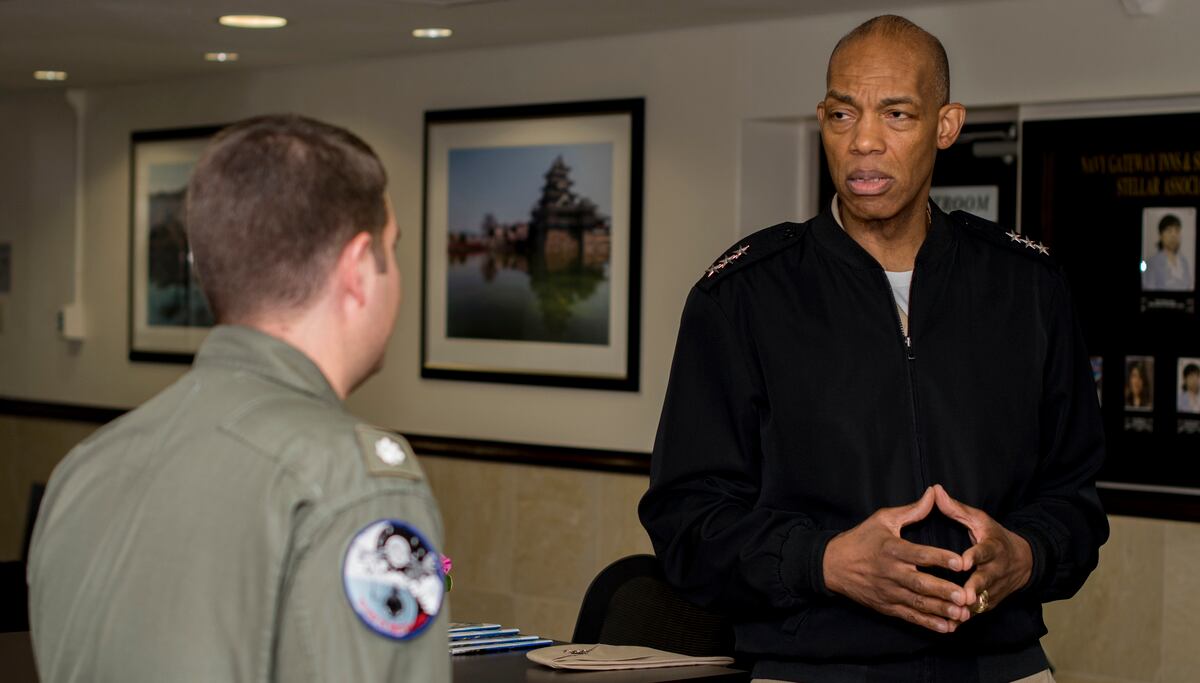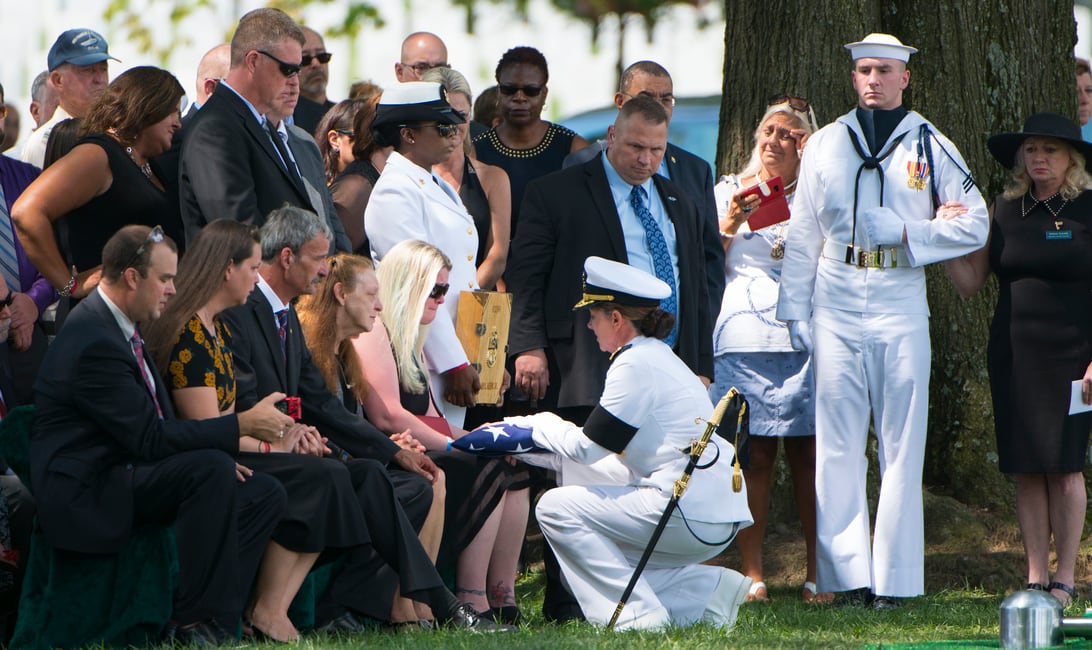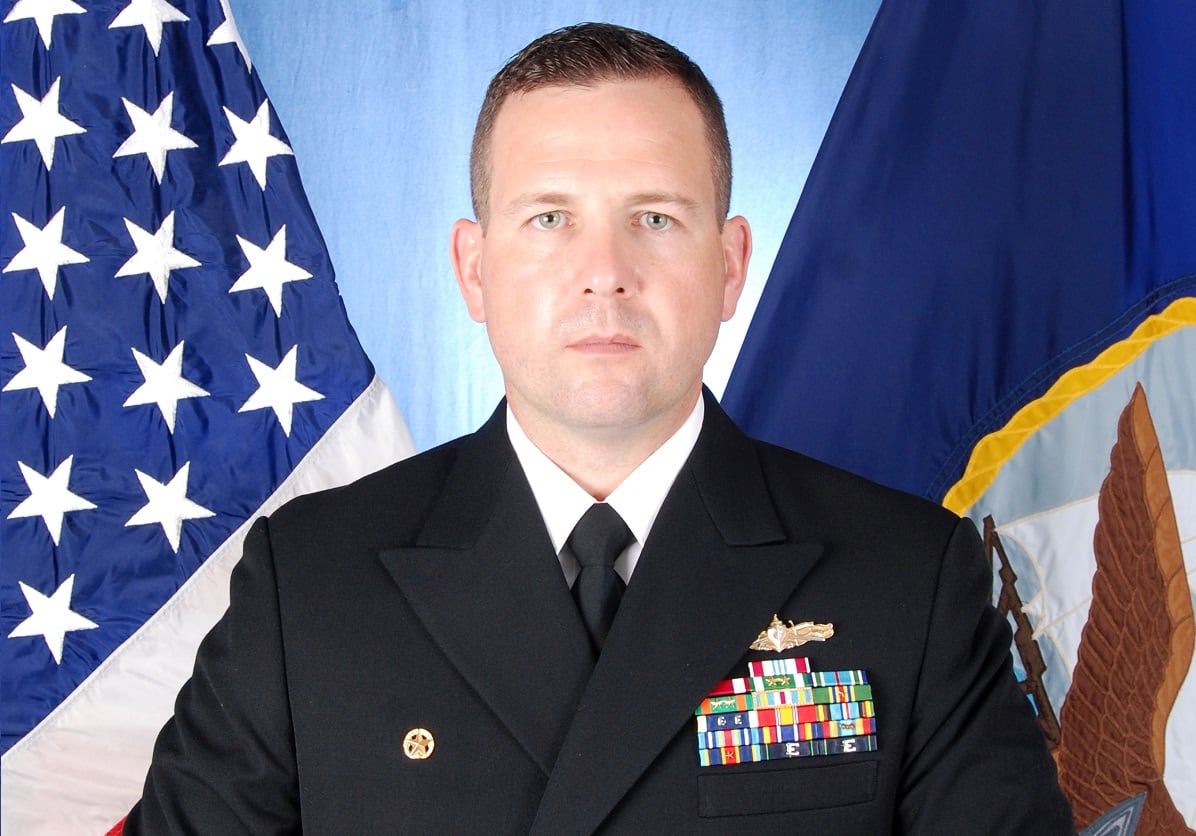The Navy’s top spokesman was behind the distribution of an opinion article shared on the sea service’s official social media accounts that blamed the 2017 warship Fitzgerald’s collision on its crew.
Capt. Gregory Hicks, the Navy’s acting chief of information, confirmed to Navy Times Friday that he directed the piece to be shared and quoted on official accounts last month.
Lawyers for two Fitz officers awaiting trial for their alleged role in the fatal disaster say this is the latest example of unlawful command influence in the court-martial cases against Lt. Natalie Combs and Cmdr. Bryce Benson. They contend senior leaders have so tainted the judicial process that their clients can’t get fair trials.
Combs was the top officer in the guided-missile destroyer’s electronic nerve center when the warship collided with the civilian container vessel MV ACX Crystal on June 17, 2017, off the coast of Japan, killing seven American sailors.
The Navy’s official Facebook and Twitter accounts shared a commentary on Feb. 8 by retired warship skipper and defense analyst Bryan McGrath entitled “The Fitzgerald collision: In search of an onus” that ran on the defense news site War on the Rocks.
The Navy tweets quoted excerpts from McGrath’s piece that laid blame for the collision at Benson and his crew’s feet.
“Assigning this level of blame to the commanding officer does not let the chain of command or ‘Big Navy’ off the hook…rather, it places responsibility where it properly lies,” the quotes tweeted by the Navy read. “The chain of command and Big Navy cannot be onboard all the time and cannot be expected to create individual solutions to individual ship problems. Commanding officers are responsible for solving these problems.”


Some online outcry ensued, with some calling it another case of unlawful command influence and the posts were deleted the next day.
Through fellow Navy spokesperson Capt. Thurraya Kent, Hicks declined Friday to say why he directed the opinion piece to be shared on official Navy accounts.
Chief of Naval Operations Adm. John Richardson did not direct the article to be posted or removed, according to his spokesman, Lt. Cmdr. Jacqueline Pau.
Vice Chief of Naval Operations Adm. Bill Moran’s spokesman, Lt. Cmdr. Shawn Ecklund, said his boss also played no role in the article’s posting or removal.
In a Feb. 27 sworn affidavit entered in the Combs case, Christopher J. Madden, a civilian Navy information office employee, said Hicks directed that the article be shared, and that the order came after a discussion Madden had earlier that day with Ecklund “discussing the merits of the War on the Rocks article.”
“At no time did he indicate, or did I ask, about VCNO’s desire to amplify this content,” Madden’s affidavit states.
Both Madden and coworker Jason S. Kelly, who also submitted a sworn affidavit, said they had no information on whether the CNO, VCNO or their attorneys “were aware or involved in directing the information to be posted or directing the post to be removed.”
“It was something we talked about as far as organizationally and within the line of public affairs,” Hicks said Friday when reached by phone. “We thought it was a good article that expressed some good, decent views and thought it was something that merited us to highlight.”
“Clearly it was something that we’ve since taken down and moved on,” he added.
Hicks said the official Navy accounts have posted “other outside third-party media articles” in the past, but the accounts are largely command products.
Hicks placed the article and excerpts on his personal Facebook page as well, which he defended.
“I’m not trying to do anything besides show what I’m reading, what I think and what I personally want to share with friends and family and members in the media who want to be friends,” Hicks said. “I have a personal life and I have a professional life.”
RELATED

Dubbed the “mortal enemy of military justice” by higher courts, unlawful command influence, or UCI, occurs when superiors utter words or take actions that wrongfully influence the outcome of court-martial cases, jeopardize the appellate process or undermine the public’s confidence in the armed forces by appearing to tip the scales of justice.
Improper comments by military leaders might make it difficult for the accused to get a fair trial because potential panel members could be influenced if they know what their superiors feel about a case.
The Navy’s Twitter and Facebook posts tied to the opinion piece were cited last month in a motion by Combs’ attorneys to get her case dismissed due to what they contend is repeated examples of unlawful influence by Navy brass.
The Navy’s Facebook has more than 3 million likes, while the Twitter account has more than 1.1 million followers.
“The use of official social media accounts to share an article that places guilt on Lt. Combs is an improper manipulation of the criminal justice process which negatively affects the fair handling of her case,” the motion states. “Whether this manipulation is intentional or not is irrelevant.”
David Sheldon, the civilian defense attorney representing Combs, told Navy Times it “boggles the mind” why Pentagon leaders would share those opinions on official social media sites while UCI motions were being weighed by military judges.
“I’m absolutely flabbergasted that the Navy continues to undermine the prosecution of this case,” he said. “If they had any sense of fairness or rightness, they would stop. It’s preventing Lt. Combs from receiving a fair trial.”
RELATED

Benson’s lead attorney, Lt. Cmdr. Justin Henderson, emailed Richardson’s legal team on the day of the posts, asking that they be taken down.
In his message, he noted that the judge in Benson’s case ruled in December that a stream of public statements by Navy leaders regarding the case presented the appearance of UCI.
“The repeated statements from (Richardson) and (Vice Chief of Naval Operations Adm. Bill Moran) about the accused’s specific case would cause an objective, disinterested observer, fully informed of all of the facts and circumstances, to harbor a significant doubt about the fairness of the proceeding,” judge Capt. Jonathan Stephens wrote in his December ruling.
“Despite that clear ruling, the Navy persists and now even expands on its strategic messaging campaign of blaming the collision on (Cmdr.) Benson,” Henderson wrote in the email. “Words fail to describe the impropriety of these Tweets.”
Not only did the Navy’s posts undermine Benson’s presumed innocence but they flouted the judge’s findings and military law that should prevent those actions, Henderson added.
Several Navy attorneys complained to Naval Legal Service Command about the posts, according to legal filings by Combs’ defense team last month.
“The quick removal of the offending post and tweet speak to the Navy’s consciousness of guilt in making the post in the first place,” one motion states. “This egregious use of official social media accounts while litigation is ongoing in Lt. Combs’ case constitutes actual unlawful command influence.”
RELATED

The motion also highlights selected reactions to the Navy sharing the article.
An objective member of the public would see such posts and “conclude that the social media posts were the Navy leadership throwing Combs ‘under the bus’ by trying to shift blame from senior leaders to the officers on the ship,” the defense team wrote.
The motion ends with a request that two senior Navy attorneys and CNO Richardson be produced as witnesses at an upcoming hearing.
In a Combs case filing Friday, however, prosecutors argued that the social media posts failed to constitute actual UCI, and that any appearance of UCI can be mitigated later.
“CHINFO quickly addressed its Twitter post when it removed the link to the article the very next day,” the filing states. “The Government maintains that there is no actual or apparent unlawful command influence in this post.”
Last month, judge Stephens disqualified Adm. Frank Caldwell, a CNO staffer and head of Naval Reactors who was appointed as the “Consolidated Disposition Authority” to mete out punishment in both the Fitz disaster and a similar 2017 collision involving the guided-missile destroyer John S. McCain and a civilian vessel.
Occurring two months after the Fitz collision, the McCain accident near Singapore killed 10 more sailors.
Stephens ruled that Caldwell failed to remain impartial in Benson’s case, which left the Pentagon to find a way to reconvene a court-martial already plastered with UCI allegations involving the Navy’s top uniformed leaders.
Combs’ attorneys await a similar ruling on their UCI allegations against Caldwell, filings that threaten to remove him for her case, too.
Geoff is the managing editor of Military Times, but he still loves writing stories. He covered Iraq and Afghanistan extensively and was a reporter at the Chicago Tribune. He welcomes any and all kinds of tips at geoffz@militarytimes.com.




